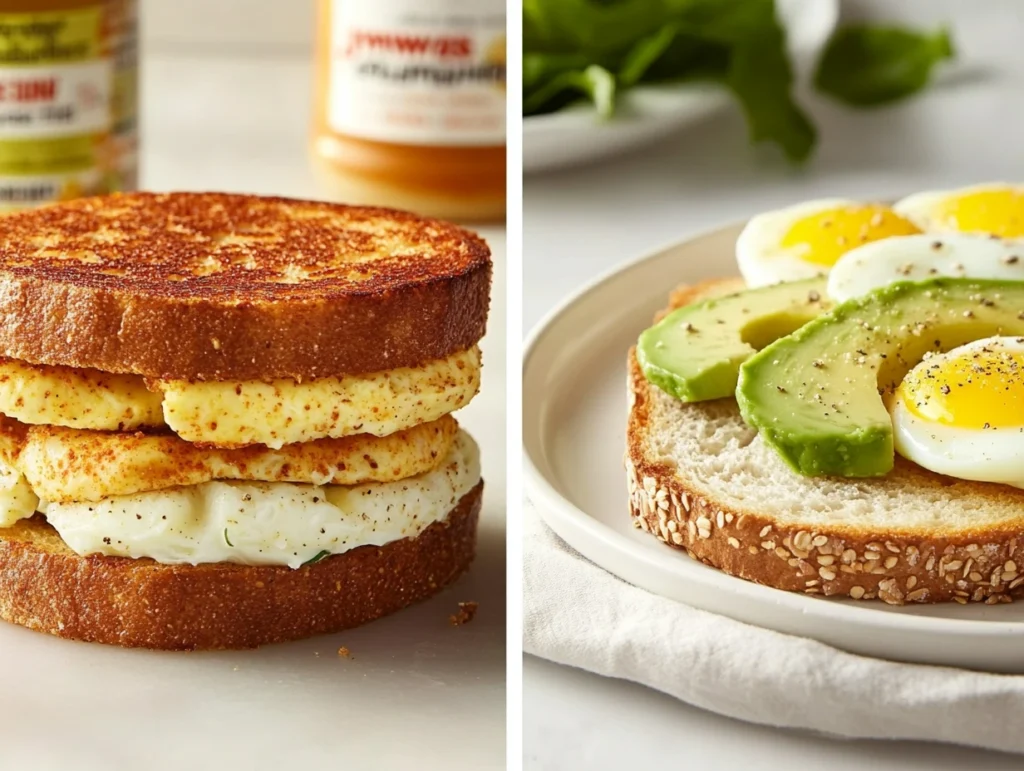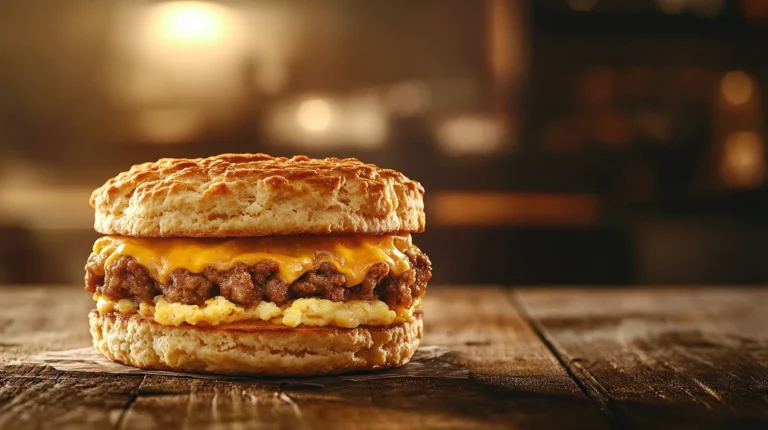Jimmy Dean frozen breakfast sandwiches have become a go-to option for people seeking a quick and satisfying meal to jumpstart their day. But as convenience often comes with trade-offs, many wonder: Are Jimmy Dean frozen breakfast sandwiches healthy? This article dives deep into their nutritional value, ingredients, benefits, and potential health concerns. Whether you’re a fan or just curious, let’s uncover whether these breakfast bites fit into a balanced diet.
Introduction and Background
Overview of Jimmy Dean Frozen Breakfast Sandwiches
Jimmy Dean has been a household name for decades, providing easy-to-prepare meals that satisfy morning hunger pangs. But behind the brand’s comforting image lies a need to assess whether their frozen breakfast sandwiches are truly good for you. With options ranging from sausage-and-egg muffins to croissant sandwiches, they’ve captured the market for fast, hearty breakfasts. However, this convenience raises questions about health.
Brief History of Jimmy Dean Products
The Jimmy Dean brand was founded by the famous country singer Jimmy Dean in 1969, initially specializing in premium pork sausage. Over time, the brand expanded into frozen foods, earning a reputation for quick and flavorful breakfast items. Their focus on providing protein-packed meals for busy individuals has made them a staple in grocery freezers across the U.S.
What Are Jimmy Dean Frozen Breakfast Sandwiches?
Jimmy Dean frozen breakfast sandwiches are pre-assembled meals featuring layers of protein (like sausage or eggs), cheese, and bread. Popular options include English muffins, croissants, and biscuits, catering to a wide range of preferences. These sandwiches aim to deliver convenience without compromising on taste.
Key Features of Jimmy Dean Breakfast Sandwiches
- Variety of Flavors: From classic sausage-and-egg combinations to plant-based options, the brand caters to diverse tastes.
- Ready in Minutes: With microwaveable packaging, these sandwiches provide a hot breakfast in under two minutes.
- Portable Meals: Ideal for on-the-go mornings, they’re an easy grab-and-go solution.
Defining “Healthy” in Context
The term “healthy” means different things to different people. For some, it’s about calorie control; for others, it’s avoiding processed ingredients. When evaluating Jimmy Dean frozen breakfast sandwiches, it’s crucial to consider factors like macronutrient balance, sodium levels, and ingredient quality.
Nutritional Factors to Consider
A balanced breakfast provides energy, keeps hunger at bay, and supports long-term well-being. While these sandwiches pack a decent amount of protein, they may also contain high levels of sodium, saturated fats, and artificial ingredients. That’s why it’s essential to analyze the nutrition facts and weigh the pros and cons.
Balancing Convenience and Health
Let’s face it, mornings can be chaotic! Grabbing a Jimmy Dean breakfast sandwich can save time and effort, but are they worth it nutritionally? Striking the right balance—pairing convenience with wholesome choices—is key.
Nutritional Profile and Ingredients
Nutritional Breakdown
When it comes to Jimmy Dean frozen breakfast sandwiches, understanding their nutritional composition is essential. These sandwiches typically contain ingredients like sausage, eggs, cheese, and bread, making them rich in protein and fats. However, there’s more than meets the eye in their nutrition labels.
Calories in Jimmy Dean Breakfast Sandwiches
Most Jimmy Dean sandwiches range between 250–450 calories per serving, depending on the variety. While this calorie range might fit into a daily diet, it’s essential to note what contributes to these calories—primarily fats and carbohydrates. For individuals on calorie-restricted diets, portion control becomes crucial.
Macronutrient Distribution (Protein, Fats, Carbs)
- Protein Content: With around 10–14 grams of protein per sandwich, these meals deliver a decent protein punch, ideal for staying full longer. Protein is a vital nutrient that helps maintain muscle mass and supports overall health.
- Fats: Saturated fats make up a significant portion, particularly in sausage and cheese varieties. High-fat content can contribute to heart health concerns when consumed excessively.
- Carbohydrates: The bread component—whether a biscuit or croissant—contributes carbs, offering quick energy but sometimes lacking fiber for sustained fullness.
Sodium and Preservatives
One major drawback of Jimmy Dean frozen breakfast sandwiches is their sodium content. Many varieties contain upwards of 700–900 mg of sodium, nearly half the daily recommended limit for an average adult.
- Why It Matters: High sodium levels can lead to increased blood pressure and pose risks for those with cardiovascular concerns.
- Preservatives in Focus: To maintain shelf stability, these products often include preservatives like sodium nitrite, which may not align with everyone’s definition of “healthy.”
Additives and Artificial Ingredients
Frozen foods often rely on additives to preserve flavor and texture, and Jimmy Dean sandwiches are no exception. Common additives include:
- Emulsifiers and Stabilizers: Ensure a consistent texture but can be artificial.
- Artificial Flavors and Colors: Enhance appeal but may raise concerns for those seeking clean-label foods.
While these ingredients aren’t necessarily harmful in small quantities, regular consumption might be worth reconsidering.
Protein Content: A Highlighted Benefit
If there’s one redeeming quality of Jimmy Dean breakfast sandwiches, it’s their protein. High-protein breakfasts are linked to improved satiety, better focus, and even weight management. Ingredients like eggs and sausage are primary contributors, but plant-based options are available for vegetarians.
Comparing Nutritional Value Across Varieties
- Classic Sausage, Egg, and Cheese: Higher in protein and fat, offering a heartier option for meat lovers.
- Vegetarian Varieties: Tend to have fewer calories and less saturated fat but might lack the same protein punch.
- Croissants vs. English Muffins: Croissant options often have more calories and fat due to their buttery layers.
Evaluating Health Benefits and Concerns

Health Benefits of Jimmy Dean Frozen Breakfast Sandwiches
Let’s give credit where it’s due—Jimmy Dean frozen breakfast sandwiches have some advantages that can’t be overlooked, especially for individuals seeking quick, satisfying meals. While they may not be perfect, they offer specific benefits that appeal to modern lifestyles.
High Protein Content
These sandwiches deliver a solid dose of protein, which is essential for muscle repair, energy, and satiety. A protein-packed breakfast can reduce mid-morning hunger pangs, helping you focus better throughout the day. Options like the sausage, egg, and cheese sandwich are particularly rich in protein, making them a decent post-workout snack.
Convenience for Busy Lifestyles
Mornings can be hectic, and let’s face it—not everyone has time to whip up a gourmet meal. These sandwiches are ready in under two minutes and require minimal preparation, making them a favorite for on-the-go individuals or families juggling busy schedules.
Potential Health Concerns
Despite their advantages, Jimmy Dean frozen breakfast sandwiches come with some health caveats that warrant careful consideration.
High Sodium Levels
The biggest red flag is their sodium content, which can range from 600 to 900 mg per sandwich. While sodium enhances flavor and preserves freshness, consuming too much can increase the risk of high blood pressure, heart disease, and kidney problems.
- For Comparison: The American Heart Association recommends no more than 2,300 mg of sodium per day for adults, and these sandwiches take up a significant chunk of that allowance.
Saturated Fats and Cholesterol
These sandwiches often include processed meats and cheese, both of which are high in saturated fats. While occasional indulgence isn’t harmful, eating these daily could contribute to cholesterol build-up and potential heart health issues.
- Healthier Choices: Opt for varieties with egg whites or turkey sausage, which are lower in saturated fats.
Preservatives and Artificial Ingredients
Frozen convenience foods like these often rely on preservatives such as sodium nitrite and artificial flavors to maintain taste and texture. While approved by regulatory bodies, some studies suggest limiting these additives for better long-term health.
Are There Healthier Alternatives?
For those who love the concept of a breakfast sandwich but want a healthier twist, there are alternatives worth exploring:
Homemade Breakfast Sandwiches
Making your own breakfast sandwiches allows you to control the ingredients and nutrition. Whole-grain English muffins, lean turkey sausage, fresh eggs, and low-fat cheese are excellent swaps for a healthier option.
Other Brands and Options
Explore other frozen breakfast brands that focus on organic, low-sodium, or plant-based offerings. Brands like Amy’s and Evol, for example, provide similar convenience with fewer artificial ingredients.
Special Considerations for Specific Diets
Low-Carb and Keto Diets
Certain Jimmy Dean varieties, like the Delights Egg’wich, cater to low-carb and keto followers. These options replace traditional bread with egg patties, offering fewer carbs while maintaining high protein.
Children’s Nutrition
For kids, smaller portions and lower-sodium options are preferable. Pairing a sandwich with fruit or yogurt can create a more balanced meal.
Balancing Jimmy Dean Products in Your Diet
Moderation is the key to enjoying Jimmy Dean frozen breakfast sandwiches without compromising health. Here’s how:
- Limit Frequency: Save these sandwiches for busy days rather than making them a daily habit.
- Pair with Nutrient-Dense Foods: Add fresh fruits, vegetables, or a side of whole-grain oats to balance out the meal.
- Hydrate Well: Drinking plenty of water helps counterbalance the high sodium content.
Long-Term Health Considerations
Do Jimmy Dean Frozen Breakfast Sandwiches Fit into a Healthy Diet?
When deciding if Jimmy Dean frozen breakfast sandwiches belong in your long-term diet, it’s essential to weigh their benefits against their drawbacks. While they provide convenience and protein, their high sodium, saturated fat, and preservative content can be concerning if consumed excessively. Let’s break it down further.
Balancing Convenience with Health Goals
For many, the allure of these sandwiches lies in their convenience. However, relying on processed foods too often can create an imbalance in your diet. Over time, consistent intake of high-sodium and high-fat foods may lead to:
- Increased risk of hypertension and heart disease
- Weight gain if portions aren’t controlled
- Limited intake of fresh, whole foods
To achieve balance, it’s important to integrate nutrient-dense options like fruits, vegetables, and whole grains into your meals. Using Jimmy Dean sandwiches as an occasional treat rather than a daily staple is a more health-conscious approach.
Understanding the Role of Processed Meats in Long-Term Health
Processed meats, a common ingredient in Jimmy Dean frozen breakfast sandwiches, are often linked to health risks when consumed frequently. According to the World Health Organization (WHO), overconsumption of processed meats like sausage may increase the risk of chronic diseases, including heart disease and certain cancers.
What You Can Do:
- Swap processed meats for lean, fresh proteins like grilled chicken or turkey slices when possible.
- Consider plant-based or vegetarian alternatives that are lower in saturated fats.
Are Low-Calorie Options Always Better?
Many Jimmy Dean frozen breakfast sandwiches are marketed under their “Delights” line, emphasizing lower calorie counts. While lower-calorie options may seem healthier, they aren’t always nutritionally superior.
Points to Consider:
- Some low-calorie options may still contain high sodium or preservatives.
- Focus on nutrient density—calories matter, but so does the quality of those calories.
For example, a sandwich with fewer calories but excessive sodium and artificial ingredients might not be better than a slightly higher-calorie alternative with more balanced macronutrients.
The Role of Variety in Long-Term Health
Eating the same processed meal repeatedly can lead to nutritional gaps. Incorporating variety into your diet ensures a broader range of vitamins, minerals, and nutrients. Alternate Jimmy Dean sandwiches with these ideas:
- Fresh smoothie bowls with fruits and nuts
- Overnight oats with chia seeds and honey
- Whole-grain toast with avocado and egg
Considerations for Specific Groups
Certain populations should be more cautious about regularly consuming these sandwiches:
- Individuals with High Blood Pressure: Due to their high sodium levels, these sandwiches could contribute to elevated blood pressure.
- Older Adults: Sodium sensitivity increases with age, making these sandwiches less ideal for seniors.
- Athletes and Active People: While high in protein, they may lack the complex carbs needed for sustained energy during intense activity.
Tips for Reducing Health Risks
To minimize the health risks associated with processed breakfast sandwiches, consider these tips:
- Choose Wisely: Opt for varieties with egg whites or lean meats.
- Watch Portion Sizes: Pair with healthier side items to avoid overloading on one sandwich.
- Prep Ahead: Batch-prepare homemade versions using fresh ingredients to maintain convenience without compromising nutrition.
Making Smarter Breakfast Choices

How to Choose Healthier Breakfast Options
When considering whether Jimmy Dean frozen breakfast sandwiches fit into your breakfast rotation, knowing how to make smarter choices is vital. Here’s how to balance taste, nutrition, and convenience without sacrificing your health goals.
Understanding Nutrition Labels
One of the best ways to make informed decisions is by closely examining the nutrition labels. Look out for:
- Sodium Levels: Aim for less than 20% of the daily recommended intake per sandwich.
- Protein Content: Choose options with at least 10 grams of protein to help keep you full longer.
- Calories and Fat: Select varieties with moderate calorie and fat levels, avoiding those with high saturated fat content.
For example, sandwiches with turkey sausage or egg whites typically contain fewer calories and less fat than their pork sausage counterparts.
Healthier Pairings for a Balanced Breakfast
If you enjoy Jimmy Dean breakfast sandwiches, pairing them with nutrient-rich sides can create a more balanced meal. Consider these additions:
- Fresh Fruits: A handful of berries or sliced bananas adds fiber and natural sweetness.
- Vegetables: Add a side of steamed spinach or sliced tomatoes to boost vitamins and minerals.
- Low-Fat Dairy: Pair the sandwich with a small glass of skim milk or yogurt for additional protein and calcium.
These sides not only enhance the nutritional value of your meal but also reduce reliance on the sandwich as the sole source of energy.
Homemade Alternatives
Craving the taste of a breakfast sandwich but want more control over the ingredients? Try making your own! Homemade versions allow you to customize every component, from the bread to the protein.
Simple Recipe for a Healthy Breakfast Sandwich
- Base: Use a whole-grain English muffin or a gluten-free option.
- Protein: Opt for a poached egg, grilled chicken sausage, or even a plant-based patty.
- Cheese: Use a thin slice of low-fat cheese or skip it altogether.
- Extras: Add fresh avocado slices, spinach, or a dollop of hummus for flavor and nutrients.
Homemade sandwiches are not only healthier but also cost-effective over time.
Can Jimmy Dean Sandwiches Fit Various Dietary Preferences?
With growing dietary needs and trends, you might wonder whether Jimmy Dean sandwiches align with specific preferences. Let’s explore:
Low-Carb or Keto Diet
Jimmy Dean’s “Delights Egg’wich” sandwiches are designed for low-carb eaters. With bread replaced by egg patties, they significantly reduce carbs while maintaining protein levels. However, watch the sodium content.
Vegetarian Options
Vegetarians can opt for varieties that exclude meat, but these may still contain processed cheese and preservatives. Homemade plant-based alternatives are often a better fit.
Gluten-Free Diet
Unfortunately, most Jimmy Dean breakfast sandwiches aren’t gluten-free. For gluten-sensitive individuals, creating your own sandwich with gluten-free bread is a safer choice.
Quick Swaps for a Healthier Breakfast
Here are some practical swaps to elevate your breakfast game while maintaining convenience:
- Instead of Croissants: Try whole-grain English muffins for added fiber.
- Instead of Pork Sausage: Use turkey sausage or plant-based patties to reduce saturated fats.
- Instead of Processed Cheese: Opt for natural cheese slices or a sprinkle of nutritional yeast.
These small changes can significantly reduce calories and unhealthy fats while adding beneficial nutrients.
FAQs About Jimmy Dean Frozen Breakfast Sandwiches
To help you make an informed choice about Jimmy Dean frozen breakfast sandwiches, here are answers to some of the most frequently asked questions about their nutritional value, benefits, and concerns.
Are Jimmy Dean frozen breakfast sandwiches healthy in moderation?
Yes, they can be part of a balanced diet when eaten occasionally and in moderation. Their high protein content makes them filling, but they are also high in sodium and saturated fats. Pairing them with nutrient-rich sides like fruits or vegetables can help create a more balanced meal.
How much sodium is in a typical Jimmy Dean breakfast sandwich?
Depending on the variety, a single sandwich contains 600–900 mg of sodium, which is 25–40% of the recommended daily intake for adults. This makes them less ideal for people monitoring their sodium intake, such as those with high blood pressure.
Are there vegetarian options available?
Yes, Jimmy Dean offers vegetarian breakfast sandwiches, though they may still contain cheese and eggs. For stricter plant-based diets, homemade alternatives using tofu or plant-based proteins may be a better choice.
Can I include Jimmy Dean sandwiches in a weight loss diet?
It depends on the specific sandwich and how it fits into your daily calorie and nutrient goals. Their high protein content can help with satiety, but some varieties are calorie-dense and high in fats. Opt for lower-calorie versions like the “Delights” line, and balance the rest of your meals accordingly.
Are Jimmy Dean frozen breakfast sandwiches good for children?
While kids may enjoy their taste, the high sodium levels may not be ideal for a child’s diet. If offering these sandwiches, consider splitting one into smaller portions and pairing it with fresh fruits or yogurt to improve the meal’s overall nutritional profile.
How can I make Jimmy Dean sandwiches healthier?
You can make them healthier by:
- Choosing varieties with egg whites or turkey sausage.
- Pairing them with fresh sides like fruit or a smoothie.
- Eating them less frequently and using them as an occasional treat.

